MOUNTAIN
BIODIVERSITY:

Chair Robert Andren (Sweden) (right) opened discussion on mountain
biodiversity and the Secretariat introduced documents on: status, trends
of, and threats to, mountain biodiversity (UNEP/CBD/SBSTTA/8/5);
measures for conservation and sustainable use (UNEP/CBD/SBSTTA/8/6); and
proposed elements for a work programme (UNEP/CBD/SBSTTA/8/7).
|
|
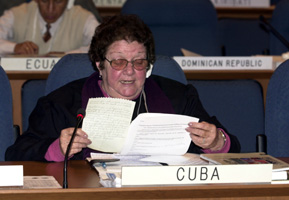
On the proposed elements for the programme of work, CUBA and
others asked for reference to indigenous communities. |
|
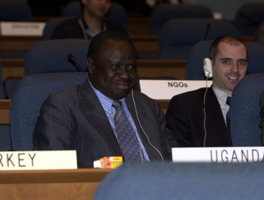
UGANDA stressed the importance of capacity building, information
exchange and incentives for mountain dwellers to adopt alternative
livelihoods. |
|

CHINA said national plans, programmes and policies should follow the
objectives set by COP-7. |
|
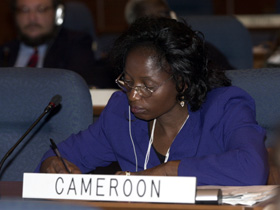
CAMEROON and others advocated expanding the expert group's mandate
to include poverty alleviation, awareness raising, sustainable use by
local communities and land-use change. |
|
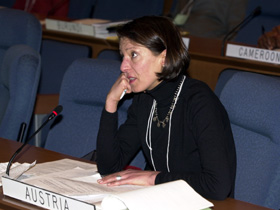
AUSTRIA stressed the need for targets and indicators, and
identifying actors, at various levels, to implement the programme of
work.
|
|
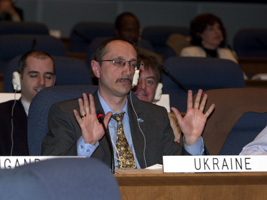
UKRAINE proposed eco-corridors and eco-nets as tools for mountain
biodiversity. |
|
| Working
Group II: |
|
|
INLAND WATERS:
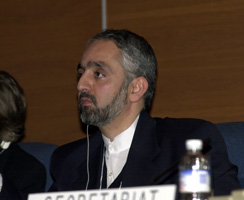
Chair Asghar Mohammadi Fazel (Iran) (right) placed the review of the
work programme in the context of the 2003 International Year of
Freshwater and the World Summit on Sustainable Development (WSSD).
|
|
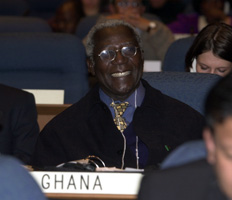
Regarding the status and trends of inlands waters (UNEP/CBD/SBSTTA/8/8/Add.1)
GHANA stressed poverty as a major threat.
|
|
|
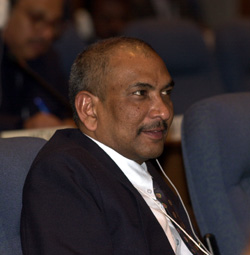
INDIA underscored community participation and noted that security of
livelihood is related to wetlands' conservation.
|
|

AUSTRALIA said the formulation of the goal on impact assessment may
cover actions for which rigorous assessment is impossible.
|
|
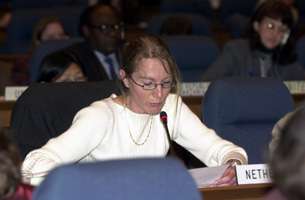
The NETHERLANDS said that work of the Organization for Economic
Cooperation and Development on incentives should be taken into account. |
|
|
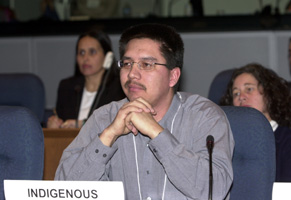
CANADIAN INDIGENOUS BIODIVERSITY NETWORK (CIBN) called for indigenous participation in inland waters'
management.
|
|
|
MARINE
AND COASTAL BIODIVERSITY:
The Secretariat introduced the
documents on: review and elaboration of the work programme (UNEP/CBD/SBSTTA/8/9
and INF/13, 15 and 16); the report of the expert group on marine and
coastal protected areas (MCPAs) (UNEP/CBD/SBSTTA/8/9/Add.1 and INF/7,
11, 12 and 14); the report of the expert group on mariculture (UNEP/CBD/SBSTTA/8/9/Add.2
and INF/6); and deep seabed genetic resources beyond national
jurisdiction (UNEP/CBD/SBSTTA/8/9/Add.3/Rev.1 and INF/3/Rev.1).
|
|
|
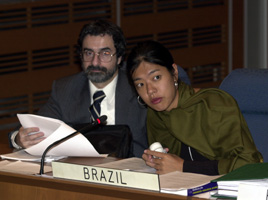
BRAZIL underscored the needs of stakeholders and local communities
in developing countries. |
|
|
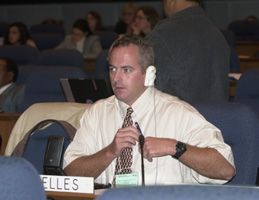
The SEYCHELLES stressed the need to reflect progress on coral reef
protection.
|
|
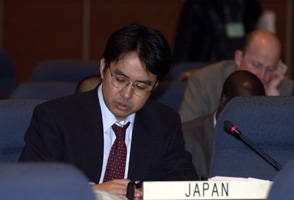
Regarding the expert group on integrated management, JAPAN requested
reconsidering its establishment. |
|
|
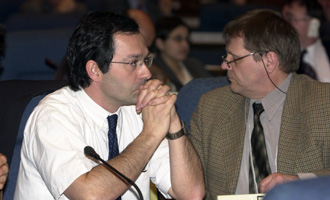
FRANCE called for in-depth studies on the MCPAs' impacts on economic
well-being and fisheries activities.
|
|
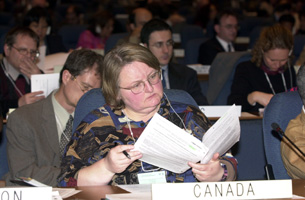
CANADA
highlighted local communities' participation when establishing and
managing MCPAs. |
|

ICELAND
called for a definition of MCPAs and highlighted the IUCN management
classification system. |
|

The US
said MCPAs are successful when science based, enforceable,
activity-oriented and consistent with international law. |
|
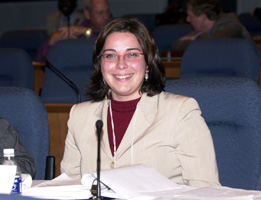
A
representative from the UN Division for Ocean Affairs and the Law of the
Sea said the jurisdictional framework for establishing MCPAs is provided
for by the UN Convention on the Law of the Sea. |
|
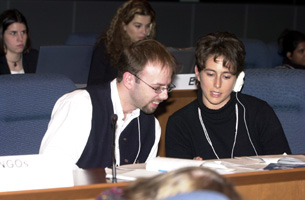
WWF
recommended a targeted monitoring mechanism on the establishment of
networks and individual areas. |
|
 Delegates
met throughout the day in two Working Groups. Working Group I (WG-I)
considered mountain biodiversity. A Friends of the Chair group on the list
of technologies and recommendations, and a contact group on the programme
of work were formed and met in the evening. Working Group II (WG-II)
addressed inland waters, and started discussing marine and coastal
biodiversity. A Friends of the Chair group met in the evening to discuss a
chair's text on inland waters.
Delegates
met throughout the day in two Working Groups. Working Group I (WG-I)
considered mountain biodiversity. A Friends of the Chair group on the list
of technologies and recommendations, and a contact group on the programme
of work were formed and met in the evening. Working Group II (WG-II)
addressed inland waters, and started discussing marine and coastal
biodiversity. A Friends of the Chair group met in the evening to discuss a
chair's text on inland waters.





















